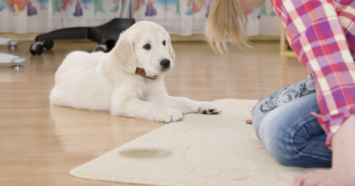
Submissive urination is typically seen in young, inexperienced dogs. As a sign of respect, the young dog will roll over on their back as they avoid eye contact, lick their lips, and let out small amounts of urine.
This behavior is typically seen during greetings or while being punished and is a sign of a submissive, insecure dog. Although the behavior often resolves itself as they mature and gain more confidence, you can help your dog by teaching them commands, rewarding them for obeying, offering more socialization, and teaching people how to best approach your dog.
Overcoming Submissive Urination
1. Meet with your veterinarian to rule out any underlying medical reasons for the behavior.
2. Keep all greetings low key:
Ignore your dog for 5-10 minutes upon arriving home or when visitors first arrive at your house. No talking to them, no making eye contact, % no attempt to pet them until they’ve settled
When greeting strangers on the street, teach them an alternative behavior such as “sit” or “shake” as a stranger approaches and reward them for obeying.
3. When anyone interacts with dogs, they should avoid:
Hovering over him
Bending at the waist & leaning into the dog’s personal space
Standing directly in front of them
Making direct eye contact
4. When anyone interacts with dogs, they should:
Allow dogs to come to them
Bend at the knees & turn their body sideways
Talk in a soft voice
Pet under the chin
Keep interactions short, about 10 seconds
If the dog rolls over while petting, immediately stop the interaction and walk away. they only get petted for confident postures (such as sit)
5. Build your dog's confidence:
Do training exercises or teach new tricks like bow, spin, or shake
Take your dog to explore new areas, go hiking, or practice agility in the backyard
Training Tip
As frustrating as it is, do not punish or scold your dog when they begin to piddle. This only causes them to piddle more and increases their insecurity. Take a deep breath and slow down the training process. Focus more on increasing their confidence through training and socialization. You may need to consult with a professional trainer for further assistance.